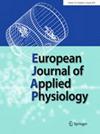长COVID患者最大摄氧量无损害?
IF 2.8
3区 医学
Q2 PHYSIOLOGY
European Journal of Applied Physiology
Pub Date : 2025-05-01
Epub Date: 2025-02-14
DOI:10.1007/s00421-025-05713-5
引用次数: 0
摘要
本文章由计算机程序翻译,如有差异,请以英文原文为准。
No impairment of maximal oxygen uptake in patients diagnosed with long COVID?
求助全文
通过发布文献求助,成功后即可免费获取论文全文。
去求助
来源期刊
CiteScore
6.00
自引率
6.70%
发文量
227
审稿时长
3 months
期刊介绍:
The European Journal of Applied Physiology (EJAP) aims to promote mechanistic advances in human integrative and translational physiology. Physiology is viewed broadly, having overlapping context with related disciplines such as biomechanics, biochemistry, endocrinology, ergonomics, immunology, motor control, and nutrition. EJAP welcomes studies dealing with physical exercise, training and performance. Studies addressing physiological mechanisms are preferred over descriptive studies. Papers dealing with animal models or pathophysiological conditions are not excluded from consideration, but must be clearly relevant to human physiology.

 求助内容:
求助内容: 应助结果提醒方式:
应助结果提醒方式:


